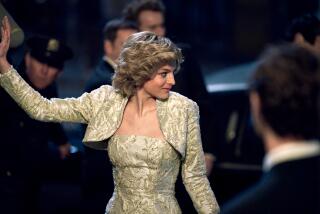‘The Handmaid’s Tale’: How Aunt Lydia’s back story came together

“I really like the fact that it’s a weakest link episode,” Bruce Miller says. He’s addressing “The Handmaid’s Tale” writers inside their Sherman Oaks offices on a weekday in late November.
“It’s like, you pull on the chain and the weakest link breaks and it isn’t who you think it’s going to be,” Miller continues.
It’s just after 10 a.m. and the team is working on the eighth episode of the current season. Titled “Unfit” and written by Kira Snyder, the episode picks up after the death of Frances, a housekeeper the series’ heroine, June (played by Elisabeth Moss), had pressured into arranging a visit with her daughter Hannah. Another handmaid named Ofmatthew, having witnessed the exchange, reports the matter to Aunt Lydia (Ann Dowd) — leading to Frances’ hanging.
“Unfit” explores the ongoing power struggle between June and Aunt Lydia, as well as how Ofmatthew (Ashleigh LaThrop) gets caught in the crossfire. The episode also, for the first time, depicts Aunt Lydia’s pre-Gilead back story.
The series’ writers are executive producer and showrunner Miller, Eric Tuchman (“Alphas,” “Eureka”), Snyder (“The 100,” “Eureka”), Yahlin Chang (“Supergirl,” “Shades of Blue”), Dorothy Fortenberry (“The 100”), Marissa Jo Cerar (“13 Reasons Why,” “The Fosters”), Lynn Renee Maxcy (“Covert Affairs,” “Alphas”), Nina Fiore and John Herrera (“Blood Drive,” “Alphas”). Jacey Heldrich is the writer’s assistant.
Does it hurt the story if Ofmatthew stands firm in her decision to snitch? What’s another way to show the power struggle between June and Aunt Lydia? Why have Lydia sing “Islands in the Stream”? Here’s a snapshot of some of the discussions surrounding the episode’s pivotal moments — as well as follow-up thoughts from Miller once the episode was completed.
‘She’s like Khaleesi’
Snyder: What I was really struck by was how different June is this season. She’s like Khaleesi. That made me think: Does that change the way we start her at the top of [the episode]? And a related question is how much of the emotional processing of the loss of Hannah do we want to see? [Because] the boss-ness of her — do we take her right to, “I want to burn something down and blow something up,” or is she still in try-harder mode? She will need to kind of get knocked down from that. And she’ll need to be reminded or told conclusively that Hannah is gone.
Miller: The thing I was trying to put myself in the place of is: For June, what’s the most interesting thing for Ofmatthew to do? Is it more interesting to have Ofmatthew at this time really feel bad and really want to apologize? Because if she’s still stubborn about it, then you’re more on the side of the handmaids who are ostracizing her. … Does it hurt the story if she’s seeking to explain herself?
Tuchman: I think Ofmatthew has to be more upset about dead Frances than about losing Hannah. Because she snitched. She had no idea they were going to end up hanging this woman. I think that’s what’s devastating to her. And as a sidebar, yes, I’m sorry that your daughter is missing. But then she can point the finger back to June: If you hadn’t been messing around with that, I wouldn’t have had to snitch.
Miller: The collective of handmaids is super important. I’d like to focus on that this episode — the dynamic between the handmaids and between the handmaids and Aunt Lydia — and stay as much in that world as possible, only because we haven’t been in that dynamic a whole lot.
Chang: And the reason I think the handmaids’ collective is important is because a lot of them have also lost their children. So their feelings about what has happened to June should be fed by the fact that their children are missing.
Ultimately, the episode opens with the handmaids and Aunt Lydia gathered to help a handmaid in labor. June stands to the side, not participating, and unbothered at the prospect of punishment. She’s too focused on being vengeful toward Ofmatthew. In solidarity with June, the other handmaids have ostracized Ofmatthew as well.
The verdict from Miller: We really wanted to show that sense of community between the handmaids. But also, the ostracizing. The most unified thing that the handmaids do is support each other. And yet they’re also horrible to one of their own. Lydia can see that no matter how much prayer and discipline and duty you try to instill into this group of handmaids, they still are women who are tough and who are going to ostracize ones who they feel like are dangerous. It’s also important that June has learned how to navigate Gilead right up to the point where she’s going to get punished. And she’s got the handmaids pushing Ofmatthew around in a really specific way that, while it does get them in trouble, it can be endured.
‘She has broken June before’
Snyder: I was re-reading in the book the segment on testifying. In the book, it happens regularly. It’s a weekly thing. And I love the idea of seeing one or more testifying sessions here. If Lydia does that, pulls the handmaids together to try to break June ... what if it goes not the way she wants and all the women testify and basically they’re saying true things but underscoring what June is saying? They are saying truths that Lydia doesn’t want to hear. I don’t know how to do it without being too ballsy. But if we can hear from some of the handmaids about what they know or what they think has happened to their kids to really drive home that Lydia is hurting them.
Miller: I love the other side of the coin: Lydia saying to June, “Doing all this made your kid demonstrably worse.”
Chang: If there are stories about children being hurt in some way: “You [Aunt Lydia] do this, Gilead does this. You fundamentally misunderstand what’s best for children.” I think that would chip away at the core of Aunt Lydia and Gilead. If they can prove somehow in very personal stories that what Gilead does and what Aunt Lydia does hurts children and they don’t understand children — what would Lydia do, how does she react?
Cerar: There could be a way where the first testifying is triumphant for June. Like, “Bah, Aunt Lydia, you brought me here to break me and you couldn’t.” Basically, you can run this a million times and it’s never gonna break me. But then for Lydia to put Ofmatthew in the center and break[ing] Ofmatthew is actually how she gets June. If June is in the center, June can control how things go. If Ofmatthew is in the center, all of a sudden June’s anger and power and energy can’t save Ofmatthew.
In the episode, sensing June’s influence over the handmaids is growing strong, Aunt Lydia calls for the handmaids to testify to release any sins they’re holding. June smugly plays along. But when Aunt Lydia brings up Hannah and how the selfishness of June’s actions hurt her daughter —the woman who cared so deeply about her is now dead — June starts to buckle. June attempts to regain some power by snitching that Ofmatthew has had thoughts about not wanting to have the baby growing inside her — a dangerous notion to Lydia, who believes such thoughts are a grave sin. Ofmatthew, collateral damage in the power battle, breaks down. Lydia feels like she fixed Ofmatthew, not quite giving June the outcome she hoped for.
The verdict from Miller: The testifying scene is a really good example of how June has grown. The difference between the terror that she would have had in that situation early on, and now, knowing what situations she can manage.
‘We were trying to show her as a real woman’
Snyder: I think all of that fits nicely into the back story we were talking about where she ostensibly thinks to herself that she’s helping this kid by separating him from the mom.
Miller: Aunt Lydia is uncomfortable when things are out of her control. Her recognizing in herself what happened to Ofmatthew — that she’s been snapping and breaking and acting out of control. I think Aunt Lydia does feel like it’s her fault that she’s been setting a bad example.
Someone who has gone through something terrible, they work so hard to avoid it again. And that’s what Lydia is doing. She doesn’t like losing control, as we see in the flashback. And that’s what been happening this season. That’s what she’s put all her effort into containing. For Lydia, it’s an assertion of power … she doesn’t do anything physically to this mother in the flashback, but she really wrecks her by kind of being her friend and then turning on her. The way the woman perceives it, Lydia perceives it as something else.
The episode flashes back to Aunt Lydia’s time as a teacher. She befriends Noelle, the mother of a student she’s concerned about, and Noelle encourages Lydia to go on a date with a co-worker and longtime crush, Jim. They sing karaoke to “Islands in the Stream,” and at the end of the evening, her passions awakened, Lydia tries for an intimate moment with Jim. But he puts a stop to it, and she’s humiliated. A few days later, she reports Noelle to Child Protective Services under the guise that she’s protecting her student from his mother’s corrupting influence.
The final verdict from Miller: As a group, we quickly realized that we were not going to be able to do a comprehensive sense of how this person became this person, because it’s far too complex. Instead, we gave a flashback to what we thought was an interesting moment that Aunt Lydia would be thinking about now — as she’s thinking about the well-being of children and as she’s struggling with maintaining control. What we were looking for was a moment when her empathy, her humanity, her sense of how God wanted the world to work, and her sense of duty were all swirling around. And we see that in the first classroom scene.
Outside of that, it was important to show her as a human being with desires that she feels are healthy, and an expression of how she feels about this guy. She’s desirous of him and I think it’s awesome that she’s desirous of him. But she’s like, “Oh, I let it get away from me.” We were trying to show her as a real woman, as a sexual person. She certainly is a person with strong passions in Gilead. As for “Islands in the Stream”... she is very much an island in the stream. The world, the culture, is passing her by, and she is very solid on her moral island.
Full script pages
Twitter: @villarrealy
More to Read
The complete guide to home viewing
Get Screen Gab for everything about the TV shows and streaming movies everyone’s talking about.
You may occasionally receive promotional content from the Los Angeles Times.







